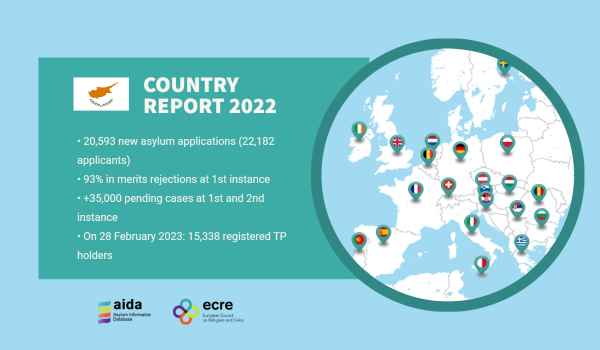The updated AIDA Country Report on Cyprus provides a detailed overview on legislative and practice-related developments in asylum procedures, reception conditions, detention of asylum seekers and content of international protection in 2022. Further, the report includes an annex providing an overview of temporary protection.
Throughout 2022, pushbacks at land and specifically at the Green Line continued, as third country nationals are denied access to territories under the effective control of the Republic and to the asylum procedure, even when trying to cross from the official checkpoints. The majority arrived by irregularly crossing the ‘green line’. Throughout the year, measures were taken to prevent migrants crossing the Green Line, including hiring 300 border guards who will monitor the Green Line, continuing the installation of the surveillance system and extending the wire fence. According to the authorities when migrants are identified attempting to cross the Green Line, attempts will be made to stop these persons from crossing or, if this is not possible, they will be transferred to Pournara First Reception Center. Regardless, the majority of new arrivals in 2022 came from the land border, and the number of submitted asylum applications continued to increase, so that Cyprus remained the EU Member State with most applicants per capita. The backlog of pending asylum applications remains extremely high, with long processing periods, a trend which is expected to continue throughout 2023. In 2022, 20,593 new asylum applications were submitted and 15,193 decisions were issued; 29,715 asylum seekers had their cases still pending examination at year end before the Asylum Service, and 6,609 at 2nd instance, before the IPAC. Moreover, by the end of February 2023 the country registered 15,338 temporary protection holders.
Reception standards remained below adequate levels, exposing asylum seekers to risks of homelessness and destitution. The majority of asylum seekers are hosted in the community instead than in reception centres, and often live in extremely poor conditions. Reception centres are overcrowded and in need of infrastructural renovation; sanitation and hygiene are below standard, and no sufficient safeguards against sexual and gender-based violence for children and single women are in place. The timely identification and response to the needs of vulnerable individuals, including children, both within reception facilities and in the community, requires improvement.
Some improvements were made by simplifying the procedures required to hire asylum seekers, which facilitated access to employment and increased the numbers of asylum seekers accessing the labour market. However, poor working conditions and lack of respect for labour rights were still a concern. Gaps remain also for what concerns child protection, particularly in the First Reception Centre of Pournara, where children remain without adequate guardianship, and are as such exposed to various risks, such as trafficking, sexual or labour exploitation. Procedures regulating the assessment of the child’s best interest are also lacking.
The lack of integration opportunities remains one of the most problematic elements of the national asylum system. A new integration plan, which was developed under EU funding with the aim of adopting a multi-year integration strategy, was finalised yet eventually abandoned. Naturalisation is increasingly difficult to access for most refugees, including those who have been living in Cyprus for well over 10 years, were born in the country or arrived at a very young age. In many cases, the decision rejecting the application mentions that the refugee does not have sufficient ties to the country or is a burden for the state. Such findings are generally not justified, indicating an overall strict and negative attitude toward granting nationality to refugees. Furthermore, in practice there is no access to long term residence or any other permanent status.
For further information:
- Find comparative information in the Asylum Information Database (AIDA) managed by ECRE

